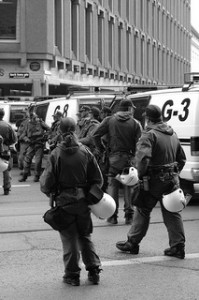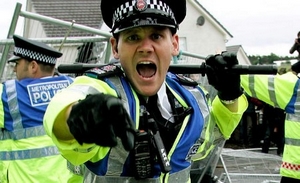Photography & Police – What You Can Do (and what you can’t…)
It seems there’s a never ending stream of pictures, stories and videos appearing both in printed, “mainstream” and online media about the problems photographers get into when dealing with the police and security. We thought we’d take a closer look at some of the stuff that you can do as a cop or security officer, and what you can do as a photographer – or better yet; as both.
Let’s get this straight first; when we say “photographer”, we mean anyone taking pictures or video. Photographer means “one who writes with light”, and you don’t need to be paid or to have a press pass to be one. Or a badge, for that matter. So what should you do if you run into problems with a photographer? Or if you’re a photographer running into problems with security or cops?
The Number 1 Rule

Stay Calm. This goes for everyone. If you’re a cop or security officer, getting agitated will get you into trouble, some way or another. That video goes up on YouTube or that picture of you yelling with spittle flying and face contorted? It’s gonna have a million views on Flickr before the weekend’s over. Even if your company or department backs you up, there’s no undoing that damage.
If you’re a photographer, staying calm will keep you out of jail. Or out of a headlock or an unexpected, close-up look at the ground. It will also help you in any and every case you might face, be it a fine or a warning or a complaint about an unlawful stop that didn’t have any repercussions. Stay Calm. There’s no substitute for that.
Number 2: Have information ready
Look, you don’t need to carry your MOB all over the place. Or, you don’t have to carry the complete set of laws around. But, having the relevant laws and acts and regulations on you if/when you need them can save you a lot of hassle. Showing people that you’re right, and doing so in writing will often defuse a situation, and/or make sure it doesn’t escalate further.
– Show what right you have to be there. If it’s public property, then that’s no issue.
– Show what laws you’re acting under. If you’re on the other side, show what laws give you / grant you the right to do what you’re doing.
If you make sure you’re acting within those two, then you’re probably good.
Number 3: Know your rights where you are
Laws and regulations vary from state to state and country to country. In some countries, you’re forced to cooperate with the police, even if you aren’t under suspicion. That usually limits itself to identification. In the US, that’s different, and you don’t necessarily have to cooperate at all, while some states require you to provide your name.
– Be prepared to cooperate, in case the police/security have the right to demand your ID or other info.
– Be prepared to back off if the person has the right to refuse your demands for ID or information.
What and Where

US: The right to take pictures/video is protected both by the constitution and legal precedent. The US supreme court has decided on several occasions that pictures/video in public is protected. No one can take that right away, no matter what you’re filming on public land / in public areas, even if you’re photographing into private property. I.e. you can take a picture of a private building from public land.
People moving about in the public have no reasonable expectation of privacy, so you can photograph them with impunity. Cops can question you, but cannot detain, question or make demands (such as for a search) without specific suspicion or probable cause.
Europe: While being know for its liberal ways, laws and regulations in Europe vary greatly from country to country. Photography and video is usually protected by law as free speech, but you have to be careful about the manner in which you do things. France, for example have rules about publishing violent materials. That doesn’t mean you can’t take the pictures, of course.
Norway, Sweden, Denmark, Finland, Iceland are very liberal countries. However; they all have laws and regulations that makes it illegal not to identify yourself to police officers when the police demand it. Valid IDs are passports, EU issued drivers licenses, bank or post office issued ID cards with pictures and other national ID cards with a picture, name and NATID (SSN).
Free speech is protected everywhere in Europe, and cops or security are not specially protected in any way if they are in a public place. Be careful not to interfere with them, however. Italian, Spanish, Swedish and Norwegian police take especially grim views on this. Stay back and be polite and calm at all times, and you’ll do fine.
If you’re a cop or a security officer, be careful, calm and polite at all times too – you have no right to view or destroy images without a court order, and doing so will get you in serious trouble. You may ask to see images, of course – but you can’t force your way. If you’re a security officer, be extremely careful with this. Do not detain anyone without serious cause, and do not make demands for ID. That is a job for the cops, and overstepping those boundaries can result in charges.
Breakin’ It Down
In short, here’s what it’s all about:
– You can take pictures and video in two places; your own property or public property. No one can deny you that.
– Anyone can ask you anything. That means that wherever you are, cops can ask you for ID or permissions. What you can say no to, however, varies.
– You generally do not need permission to publish pictures taken in public, but privacy protection laws may have an impact. Check up on it. Also – anyone can take pictures of you if you’re in public. Remember that.
Rule number one always applies. If you break it, you’ve lost whether you’re right or wrong, one way or the other.
Let us know in the comments what your experiences are. Also, questions. We like’em.
Check out our About-page for tips on guest posting! We like those too!

0 thoughts on "Photography & Police – What You Can Do (and what you can’t…)"